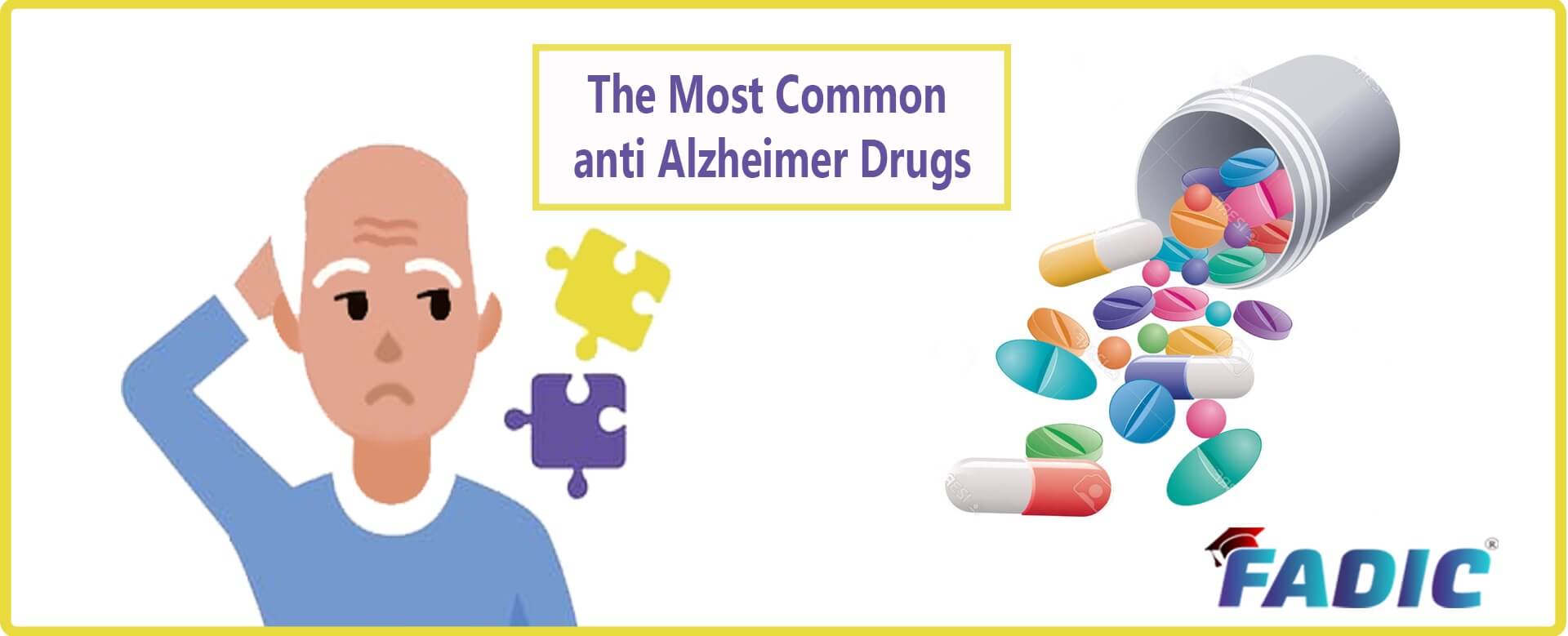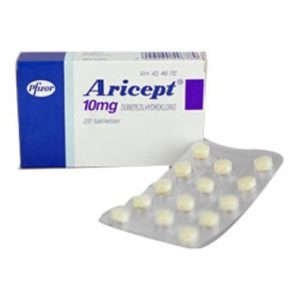Drug Treatments for Alzheimer’s Disease
Drug Treatments for Alzheimer’s Disease
The Most Famous two drugs most used anti Alzheimer’s are:
1- Donepezil 💊
2- Memantine 💊
Donepezil
- Brand Names: Aricept
- Therapeutic Category: Acetylcholinesterase Inhibitor (Central)
- Dosage Forms: Tablet, Oral
- Use: Labeled Indications: Treatment of mild, moderate, or severe dementia of the Alzheimer’s type “Drug Treatments for Alzheimer’s Disease.”
- Off-label: Dementia associated with Parkinson’s disease/ Traumatic brain injury
- Dosing: Adult: Alzheimer’s disease: Oral:
- Mild-to-moderate: Initial: 5 mg once daily; may increase to 10 mg once daily after 4 to 6 weeks; effective dosage range in clinical studies: 5 to 10 mg/day
- Moderate-to-severe: Initial: 5 mg once daily; may increase to 10 mg once daily after 4 to 6 weeks; may increase further to 23 mg once daily after ≥3 months; effective dosage range in clinical studies: 10 to 23 mg/day
- Dose Adjustments
- Renal Impairment: no dosage adjustments
- Hepatic Impairment: no dosage adjustments
- Adverse Drug Interaction:
Insomnia, Nausea, Diarrhoea, Hypertension, chest pain, syncope - Pharmacodynamics/Kinetics:
- Metabolism: Extensive hepatic metabolism
- Half-life elimination: 70 hours; time to steady-state: 15 days
- Time to peak, plasma: Tablet, 10 mg: 3 hours; Tablet, 23 mg: 8 hours
- Important Notes:
- Altered cardiac conduction: Donepezil associated with QT prolongation and torsades de pointes; use with caution in patients at risk of prolonged cardiac repolarization
- Pregnancy & Lactation: Adverse events observed in some animal reproduction studies / not known if present in breast milk
- Medication Safety issue:
Aricept confused with Aciphex, Ascriptin, and Azilect
Memantine
- Brand Names: MYLAN-Memantine
- Therapeutic Category: N-Methyl-D-Aspartate (NMDA) Receptor Antagonist
- Dosage Forms: Tablet/solution, Oral
- Use: Labeled Indications: Alzheimer’s disease
- Off-label: Vascular dementia (mild to moderate)
- Dosing: Adult Drug Treatments for Alzheimer’s Disease, moderate to severe: Oral:
- Immediate release: Initial: 5 mg daily; increase dose by 5 mg daily (if the previous dose is well tolerated) to a target dose of 20 mg daily.
- Wait ≥1 week between dosage changes. Doses >5 mg daily should be given in 2 divided doses
- Dose Adjustments
- Renal Impairment: Severe impairment: CrCl 5 to 29 mL/minute: Immediate release: Initial: 5 mg once daily; after at least one week of therapy and if tolerated, may titrate up to a target dose of 5 mg twice daily
- Hepatic Impairment: no dosage adjustments
- Adverse Drug Interaction:
Hypertension, Dizziness, confusion, headache, anxiety, depression, hallucination, pain - Pharmacodynamics/Kinetics:
- Half-life elimination: Terminal: 60 to 80 hours
- Time to peak, serum: Immediate release: 3 to 7 hours
- Absorption: Well absorbed
- Excretion: Urine
- Important Notes:
- Cardiovascular disease: Use with caution in patients with cardiovascular disease.
- Although adverse cardiac events were infrequent in clinical trials, an increased incidence of cardiac failure, angina, bradycardia, and hypertension was observed.
- Pregnancy & Lactation: Adverse events have been observed in some animal reproduction studies / not known if present in breast milk
- Medication Safety issue of Drug Treatments for Alzheimer’s Disease
- Memantine confused with mesalamine, methadone
Read More:
- Antimicrobial Stewardship School
- Sepsis Training Program
- Download Pocket Guide for Antibiotic Pharmacotherapy Book
- Microbiology Course | ABC Bacteria
- Infectious Disease E-News | FREE Subscription
- ABC antimicrobials | Know all about the Antimicrobials
- Road Map to Antimicrobial Stewardship Training Program
- Register Now in FADIC Clinical Research School
- FADIC Drug Information Fellowship
- Buy FADIC Toolkit for Writing Research to Write a Great Research Paper
- Read 10 Skills You Must Learn to Make a Research via Google Scholar in Arabic
- The FADIC Online Continuous Medical Improvement Programs & Mini-Courses.
- Check Now FADIC Book store and Buy books in different specialities.
- Watch Now FADIC TV to Keep Yourself Updated.
- FADIC Podcast focusing on varieties of pharmacist perspectives in different specialities.
- Subscribe Now to FADIC 2020 Daily News (FNN) and Keep Updated.
- Check Now about Coronavirus Resource Information Center.

 Log in
Log in Sign up
Sign up



